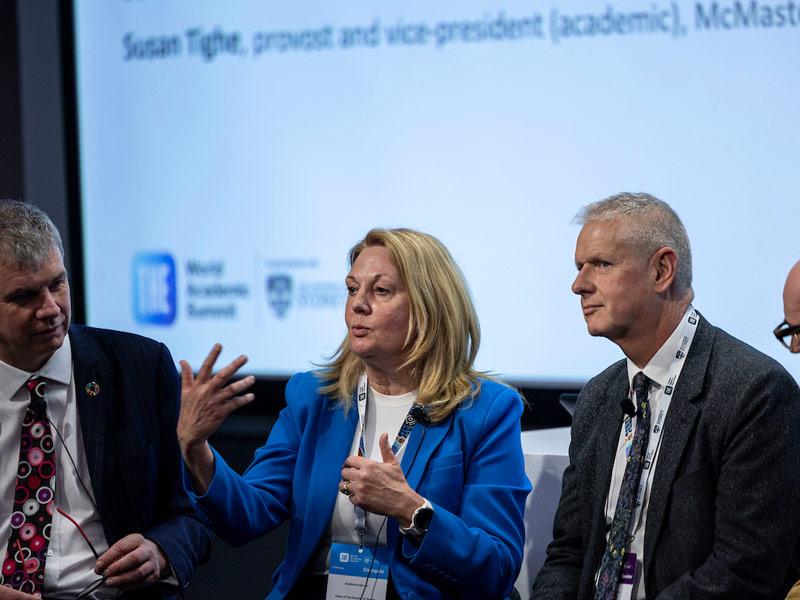The Covid-19 pandemic forced institutions worldwide to transition to an online teaching model overnight. At the 2023 THE World Academic Summit, a panel of senior academic leaders delved into how the changes induced by the pandemic have evolved into online models of education in its aftermath. The session, held in partnership with Kaplan, discussed how online degrees can support the higher education sector in broadening access and increasing diversity among student populations.
“In the higher education sector, we need to open pathways so everyone has access,” said Susan Tighe, provost and vice-president for academic at McMaster University in Canada. Tighe added that a broad range of learners are enrolling in online degrees at her university because remote learning removes many of the challenges associated with commuting to the campus.
“One of the things that online [learning] allows is extraordinary flexibility,” said Ricard Giner, vice-president of higher education at Kaplan. Debra Anderson, dean of the Faculty of Health at the University of Technology Sydney in Australia, said that undergraduate courses at her university are now predominantly in-person. Postgraduate courses have remained online to accommodate the needs of students from different backgrounds, such as working professionals, people with care responsibilities and students with disabilities.
Online degrees can reach beyond the traditional student community, especially in regions where access to higher education has been challenging – even before the pandemic. “If we are thinking about widening access and promoting inclusivity, it depends on what barriers to access actually are,” said Colin Riordan, interim secretary general of the Association of Commonwealth Universities (ACU).
The ACU’s project partnership for the enhancement of blended learning uses its network across the commonwealth to share best practice and attract funding. “There is a whole other set of barriers that you need to consider if you are looking at online degrees as a way of widening access,” Riordan said. He added that increasing access to online learning in low-income countries poses different challenges compared with wealthier nations, including issues like a lack of training support, inadequate infrastructure and limited access to electricity.
Non-academic student support plays an important role in ensuring engagement and success for those who are enrolled in an online course. “We need to have points where they can access the resources at the home institution,” said Tighe.
Finding the right balance between asynchronous and synchronous learning is important for sustaining student engagement. Having tutorials with smaller student groups and embedding student success advisors around the world are methods universities have adopted to support international students who study online. “That’s something where perhaps artificial intelligence (AI) can help,” said Giner. “Those are areas in which we can explore the use of this technology.”
Over the last few years, faculty have had the opportunity to come together and share how they are teaching in new and innovative ways using technology, Tighe said. “It’s an opportunity for us to push the boundaries in the teaching space,” she concluded.
The panel:
- Debra Anderson, dean, University of Technology Sydney
- Ricard Giner, vice-president of higher education, Kaplan
- Colin Riordan, interim secretary general, the Association of Commonwealth Universities
- Duncan Ross, chief data officer, Times Higher Education (chair)
- Susan Tighe, provost and vice-president of academic, McMaster University
Find out more about Kaplan International Pathways.


comment